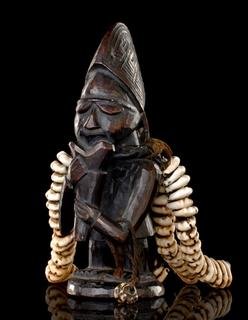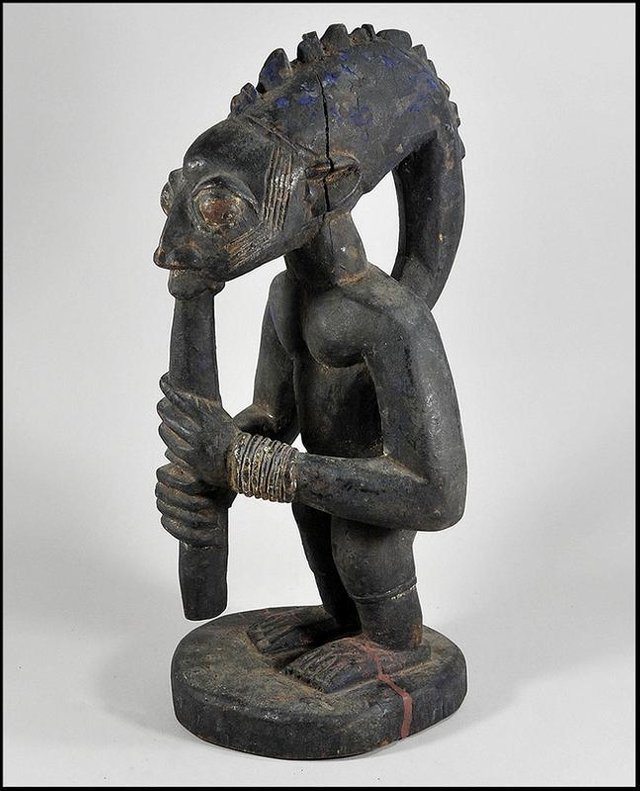Esu And Satan Are Two Different gods
Welcome to my blog friend!
Recently, I dropped two posts on ATR and tried to correct the misconception surrounding African Traditional Religion. I think to a larger extent, I was able to correct the notion that the Africans do not have a clear understanding of the Supreme Being - God. I was able to show also that the names Africans call their children are pregnant with meanings and also explains their deep understanding of God.

In this piece, I will attempt to explain who ESU is and his attributes. Esu was translated as Satan when Christianity was introduced to the African people.
It is important to know first that the English version of the Christian scripture was translated to Yoruba language by Bishop Samuel Ajayi Crowther.
Bishop Samuel Ajayi Crowther was born in Osogun is Egba land which is now known Abeokuta, the western region of Nigeria. Egba is a tribe in Ogun state Nigeria. Ajayi was taken as slave by the Fulani people when he was around 12-13 years old. Ajayi was sold to the Portuguese but his ship was intercepted by anti-slavery British navy who freed all the slaves in Sierra Leone. He came in contact with the missionaries, tutored by them and he excelled to become a mission teacher himself.
Ajayi later came back to his homeland Egba where he started a new mission and later translated the English Bible to Yoruba language.
It is important to know that translation is a form of origination. The translator in 'most' cases uses discretion or intuition to originate new things or create new meaning for a certain word. Ajayi was not an exception as he substituted the Christian Satan for the Yoruba Esu.
Is the Yoruba Esu the same character as the Christian Satan? Join me as we try to correct this together!
Ajayi Crowther was the first person to also translate the English dictionary into Yoruba langauge. One of Esu's 'lineage appraisal' is: bara ti o logun ika to so ile alarena dahoro - Bara who does not have evil medicine but turns his in-laws house into desolation. Ajayi translated ‘bara’ as god of mischief. So he thought this god called Esu is as mischievous as the Satan mentioned in the Bible.
Like the other divinities I discussed in my previous work, Esu is an intermediary between God and man. He is like the gate keeper. He is the direct link to God. Even other gods respect him. Esu is not an evil doer. In fact, Esu does not do evil!
Perhaps, we should ask, if Esu is the same character as the one described by the Christian, how come the Yoruba people name their children Esukemi, Esubunmi, Esubiyi, Esugbamila, Esuseunfunmi, Esumuyiwa and so on.
The Yoruba people build shrines for Esu and venerate him. Can we say they are worshiping and venerating the same Satan or Lucifer that rebelled against God?

Esu is the main gate between man and other gods. Esu takes sacrifices and he his in fact constantly given sacrifices by man. Esu has power to stop other gods from inflicting evils on man and he can at the same time ignore man if man (male and female) refuse to give him sacrifice. Esu, as a god, is not synonymous with evil. Esu monitors evils and keep them in check always. To cast away evil, certain percentage of the rites prescribed for the sacrifice must go to Esu before the rituals can be completed. It should be noted that by sacrifice, I do not mean human beings. I mean edible stuffs which are offered to Esu and some are shared among neighbors in what Yoruba called saara (the process of eating the stuffs together as group).
When we look at the Satan described in the Bible, he is a rebellious god. The Esu in Yoruba does not rebel and cannot rebel again olodumare (God). He has a function that no other god does and he does them since time immemorial and he is still performing his functions.
The Yoruba Esu does not resides in hell and cannot reside in hell because he does not do evil nor working against God to gain souls to himself.
We should not also forget that the translator was a 12 year old boy when he left Africa. You can imagine the little thing a 12 year old boy would know about customs and traditions. So we can understand where the misconception came from.
Today, we curse Esu and call it many names but the god is different from the one described by Christian. You can say they have similarities in terms of being tricky. But when you look at their functions, attributes and histories, you will agree that they are two different entities.
It would have been fine if Ajayi had translated Satan to Satani. Satani is more literal and okay than a total substitution. So we can address Satan in Yoruba language as Satani not Esu because they are two different gods.
You can do your research further but I assure you, you will find out more that you have been calling Esu wrongly.
I will like to read your responses and contributions.
Thanks for reading. Your boy @smyle the philosopher.
This is quite scholarly! Well done bro. This article has opened some eyes and of course raised some thoughts.
The money ritualists as we know often shed blood as sacrifice through incantations. Who do you think they call usually call on in the course, the English Satan or the Yoruba Esu? Bear in mind that any human or bloody sacrifice can never have a Godly involvement.
Bravo once more as I await your clarifications.
Perhaps now but there were times thing with blood were...
Like i said, esu can be called for good thing and he will answer. It has taboos, once he is offered his taboos as sacrifice he turns deaf hears to the person when evil knocks.
Money ritual is virtually in all tribes, if Yoruba call esu (as u assume), do you think all other tribe call same esu? Perhaps your answer is no!
Thanks for your contribution!
Hmmm...I'll rest my case for now😂😂. You philosophical assertions overwhelms me. I find you interesting really and your posts highly topical. Can't wait to meet you in person already and hey, we'll always argue on your stuffs! I feel it's healthy for learning. Peace!
Hmm.... Now I rest my case at this point. Your philosophical assertions overwhelms me. Can't wait already to see you in person. But hey, expect more questions from me in future😂😂😂 I believe it's healthy for learning. Peace
If you are my best friend, someone can plead with me to get him a favour from you. Just the same way, Aje, the god of wealth is actually a close companion of Esu. If you ask me, money rituals which do not involve human life is just like a form of prayer. I have a friend who is a staunch traditional worshipper. While conversing with him sometime back, he told me that an herbalist who does rituals which involve human life actually invokes some kinds of spirits, not gods for it.
Some kind of spirit huh? I'm curious! @smyle should consider this a worthy project someday cos I'll be interested. But @illuminatus...do you believe your friend?
Oga Smyle, this is absolutely amazing. I was talking to someone about these a few days ago. I was even going to write about it but you beat me to it. While Esu in one of his seven forms is a trickster, he is actually the messenger of the gods, much like Hermes of the Greeks. He delivers messages to and from Olodumare, who is the supreme deity. I'm usually baffled whenever I hear people refer to him as the Bible's Satan. Since there is no equivalent for Satan among the 201 yoruba gods, I think that a borrowed word should have being applied and the bible's devil should be referred to as "Satani", just the same way there is no equivalent for Jesus, hence the use of "Jesu", a borrowed word.
Assuming Esu to Satan just because he is a trickster is like assuming Sango to be Zeus or Ogun to be Hephaestus. They may have some qualities in common but they are different entities.
Thank God someone understands this well! Thank you brother! Your contribution is 💯
People should please read, ask questions and not just follow what they were told.
I really appreciate this 🙌
This is an in-dept breakdown of a significant aspect of the African Nigerian tradition weldone bro
This is a deep research. Though am not of Yoruba tribe but your analysis seems clear.
Thanks brother. People should try read.
Hmmmmm
Too much sense in this
Satan in igbo is ekwensu
And we have surname ekwensu in igbo, even igbo own was wrongly translated. Well in totality many things are very very wrong .
We see our culture and tradidtion as evil while promoting others
That ekwensu might not be esu. It could be that it has some attributes that resemble that of Satan and thr translator just assume it is Satan.
The same way the Greek "Hades" was translated as hell.
In reality is there anyone or anything that is a go-between man and God? This Esu who does good and door keeps between man and God sounds like Jesus to me. Besides what is an English name for Esu?Nice task selected
Esu does not have an English name because it is not an English god.
Haaaa. @smyle. I fear you o.
All those gods are fallen angels that gave men what they wanted for a greater price.
That's why people who get help from them have more trouble if they make simple mistakes. That's not the case with GOD.
Now, esu is still devil; satan.
Some people worshiped him.
It's the same with all tribes. He was consulted via his priests.
Note that some people still worship him and he his known for his notoriety. Often he is asked for help to do evil.
God is the only Ultimate Deity. He is the Omnipotent and Omniscient being. He alone is the true God.
Edited
Everything you wrote simply go against what was written here. Try read about esu yourself and stop written what you were told. READ PLEASE. TRY READ ON YOUR OWN. MAKE RESEARCH AND THANK ME LATER. Thanks.
:-) I was not told... I know. Thanks for sharing your knowledge. We all have our beliefs and knowledge which have been instilled from different sources.
In Yoruba mythology, there are many contradictions. However, your belief is strictly respected.
Esu was actually worshipped by people. He was the patron god of some households and they named their children in his praise. Such names can still be seen in some households today.
Hi @smyle
This is so true, they are two different entities, satan was not a god he was an angel but i dont agree with the point that esu is an intermediary between God and man the only intermediary i know is jesus, not even any angel, i also want to know what esu is called in the bible.
Thanks
@phunke
The intermediary you know in Christainity is Jesus not ATR. There are many intermediaries in ATR. So if you know only Jesus good for you. Do not attempt to call other religion false. Thanks.
Esu cannot be called anything in the Bible. Esu is not in the Bible. It is a foreign religion to the African people. Please understand that. Thanks.
Bravo bro
Smyle, I just found time to read this article of yours about Esu and Satan.
The explanation is clear.
Do you practice ATR? What would you think about anyone or god that has been labeled a trickster? Thanks a lot!
@maryfavour & @redfishpillar.